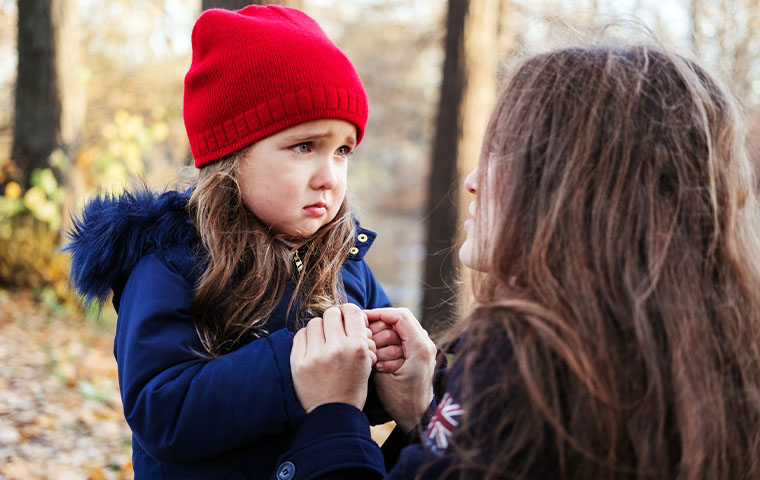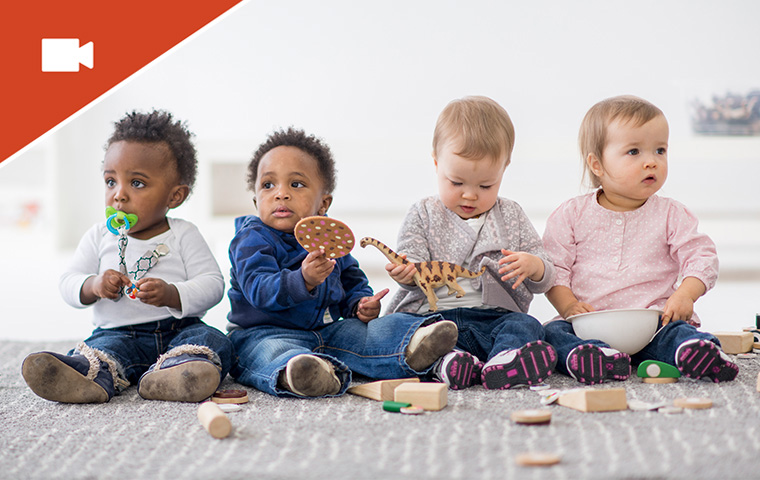7 Ways to Help Your Child with Self-Regulation
By GetParentingTips.com staff
Read Time: 7 Minutes
Every mom or dad has been there. A kindergartener has a meltdown when she doesn’t get what she wants. A seven-year-old punches his brother during an argument. A fifth grader struggles over peer pressure at school. As parents, we have an important role in helping our kids develop the self-regulation skills they need to manage their emotions and behave correctly —as children and throughout their lives.
What is Self-Regulation?
Self-regulation simply means a child’s ability to manage how he or she acts and reacts to his feelings. What does he say or do when he is angry or sad or scared? How does he express himself or behave when he doesn’t get his way? Self-regulation is how he deals with his emotions, adjusts to situations as they come up, and responds to what is going on in his environment.
Why Self-Regulation is Important
Children benefit from having the confidence to deal with their feelings and knowing how to behave in socially acceptable ways. Kids who can self-regulate get along better at home and in school. They learn essential skills to calm themselves in both familiar and new situations and to feel good about themselves. Research shows that teens who self-regulate have a strong sense of well-being and satisfaction and feel more accepted socially. That’s why the process of teaching our kids self-regulation skills starts when they are toddlers and continues as they mature. It’s about giving them a strong foundation to deal with whatever life throws at them.

Why Kids Act the Way They Do
Considering your child’s age is important when helping him manage his feelings.
Brain development determines what things children can do and when they can do them. The front of the brain (prefrontal cortex) controls the ability to reason, solve problems, talk about emotions, and manage impulses. Since this part of the brain is not fully developed, young children cannot self-regulate in the same ways as older kids.
Research also shows that a younger child’s brain has not yet reached the stage where he can easily switch between one task and another. For example, when you ask your child to stop playing a video game and get ready for bed, he may throw a fit because he doesn’t know how to show his disappointment and frustration. Punishing him for acting out won’t solve a problem that he doesn’t have the ability to solve yet.
This is where age-appropriate self-regulation activities come into play.
Since young children can self-regulate only for a short time, keep your child’s age in mind when you plan activities.
7 Ways to Build Your Child’s Self-Regulation Skills
Try these tips to help your child learn how to manage his emotions and make good behavior choices.
Be realistic about your expectations.
Your child isn’t going to learn self-control and coping skills overnight. Self-regulation is a process that can take years, and it will evolve as he matures to a young adult. Realize that children need time and different levels of support to learn and practice how to deal with anger, sadness, fear, and other emotions. Their success will grow as they grow, so prepare for the long haul and celebrate every sign of progress—large or small—as it happens. Setbacks are normal, so keep at it and don’t get discouraged.
Validate and empathize with your child’s feelings.
Self-regulation is about more than just controlling emotions. It’s about helping your child recognize his feelings and learn how to deal with them in an acceptable way. Encourage your child to put how he feels into words so he can begin to understand why he feels the way he does.
After he calms down from an emotional outburst, use the opportunity to talk to your child about what is triggering his emotions. You can help him name his feelings by asking him to fill in the blank: “I feel _________.” Just putting a label on feelings can go a long way toward helping him understand what happened and how he responded.
Saying “I understand it made you angry when your little brother broke your LEGO castle” lets him know you understand he is upset and shows him you can see things from his view. It also opens the door to talk about how he could have handled the situation in a way other than hitting his sibling. Over time and with your encouragement, he’ll begin to learn ways to self-regulate and make different choices.
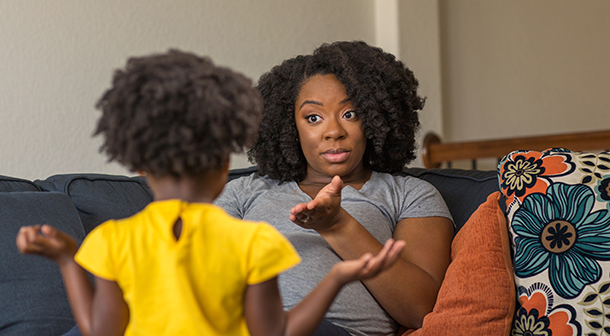
Empower your child to succeed.
Provide structure so your child knows what to expect and how to handle mealtime, study time, bedtime, and playtime. It helps children to have a consistent routine that doesn’t overload them. Structure and routine will help your child to learn what he is capable of and make it easier for him to do the right thing. For example, having a set bedtime is a chance to practice how to follow a simple rule, and it gives him the confidence that he needs to learn how to behave in other situations.
As your child gets older, let him solve his own problems. When he puts off doing his homework and is upset and having trouble finishing an assignment, you may be tempted do it for him. It’s better to be supportive and offer some help, but let it be his responsibility to finish his work. It’s both a self-regulation learning experience and a confidence-builder when he realizes he can manage his frustration and work through a problem. This positive reinforcement will help him better deal with his next challenge.
Need parenting help now?
The Texas Parent Helpline is available 24/7.
- Call 833-680-0611
- Chat with us
- Text 833-680-0611
Praise and reward positive behavior.
Using positive reinforcement and rewards is a good way to motivate children of all ages to manage their feelings and behavior.
- Make a checklist of things you know your child can do. Together, the two of you can decide on the reward when he completes one or more tasks.
- Give lots of praise when your child does what you expect of him.
- For older kids, select rewards that include everyday privileges (screen time, television, anything your child enjoys) or special privileges (movies, activities, a treat from the store).
- Give immediate feedback. If your child doesn’t succeed the first time, talk to him about it and let him decide how to do better next time. Second, third, and fourth chances are your friend.
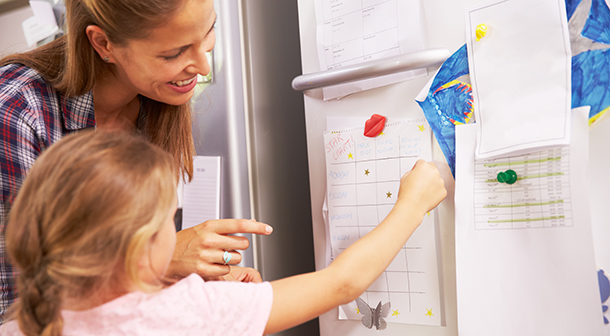
Support your child to set and achieve a goal.
Having a goal is another way to help kids self-regulate, learn to manage, and react to their feelings, and choose the most appropriate response. Goals should be:
Realistic and achievable.
It won’t be helpful if your child’s goal is something he can’t achieve. He may desperately want to go to Disneyworld, but if it’s not in your budget, maybe a more realistic goal is going to a nearby amusement or water park.
Specific.
Your daughter’s goal to be best dancer on the dance team sounds great, but what does that really mean? How will she know she’s the best? What will achieving that goal look like? Help her set a specific and measurable goal, like learning to do a high kick or the splits.
Personal.
Your child’s goal needs to be his idea for him to be committed to achieving it. He must want it, be invested in it, and be willing to do the work. Once he’s decided on his goal, you can help by supporting him, listening to him if he gets discouraged, and helping him create and stick to habits that will help him reach his goal.
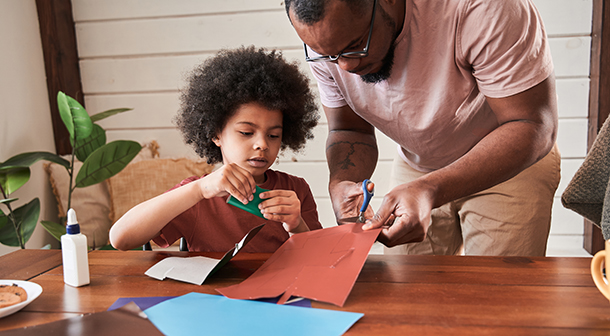
Find ways to help children manage their emotions and behavior.
Self-regulation isn’t about being perfect all the time. None of us always makes the right decisions, and emotions can get the best of children and adults. It’s normal to make mistakes, learn from them, and try again.
Children need specific things to do that help them keep their emotions in check, calm them when they’re upset, and make good choices about how to act. While it’s important to do things with your child to help him self-regulate, it’s also important for him know what he can do to help himself when you’re not around.
Self-regulation things you can do together:
- Talk about your child’s feelings.
- Go for a walk.
- Listen to music.
- Take deep breaths.
- Count backward from 10.
- Talk about something that makes your child laugh.
- Blow bubbles.
- Read a book.
- Sing a favorite song.
- Watch your child’s favorite movie.
- Play your child’s favorite game.
- Hug each other.
- Dance.
- Play.
- Have a snack.
Self-regulation things your child can do alone:
- Play with his pet.
- Squeeze a stress ball.
- Draw a picture.
- Write about his feelings.
- Take a bubble bath.
- Hit a punching bag or pillow.
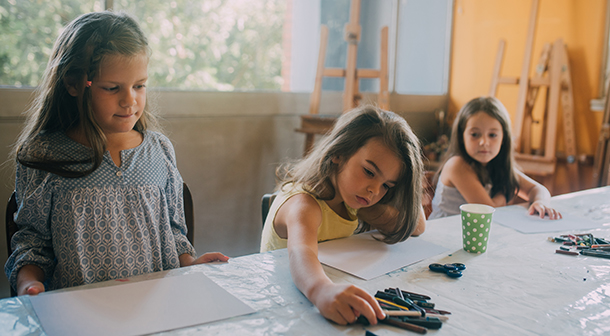
Be a good example.
One of the hardest and most important things you can do to teach your child how to self-regulate is to be a good role model. Kids learn by watching what we do. If we control our anger and frustrations, our children see how and what to do. When they see us stay calm when they’re having a temper tantrum or meltdown, they see another and better way to handle an emotional situation.
Self-Regulation is a Marathon, Not a Sprint.
It takes time and practice for children to learn how to cope with strong emotions and act in appropriate ways. But the payoff for our kids is worth every ounce of the effort it takes to learn that self-regulation is:
- Staying calm when they feel upset.
- Stopping to think before they act.
- Doing what is expected of them, even when they don’t want to.
- Waiting to get what they want.
- Adapting to changes around them.
- Cooperating with others.
- Feeling confident about themselves and their ability to handle situations.
Best of all, when kids master self-regulation skills, they are better equipped to deal with the challenges they’ll face throughout their lives.


